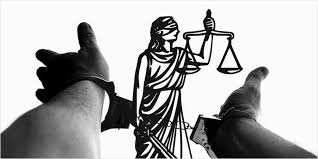The rights of the accused begin from the time of his arrest. Article 22 of the India Constitution provides for the protection of the arrested person to the extent that he has a right to be informed of the reason for arrest and he must be produced before the nearest magistrate within a period of 24 hours. Article 22 (1) also provides that he shall be entitled to consult and to be defended by a legal practitioner of his choice. Section 50, CrPC which is a corollary to Article 22, Clause (1) and (5) of the Constitution of India, enacts, that the persons arrested should be informed of the ground of arrest, and of right to bail.
For the custody to be a legal, a person may not be held in custody for more than 15 days. A magistrate must be convinced that that there are exceptional circumstances present to extend this custody for a maximum of 60-90 days depending in the nature of the crime being investigated. A Judicial Magistrate has the power to grant police the custody of a person for 15 days. Police custody can only extend up to the period of 15 days. Beyond this, even if the custody of the person is required, it has to be judicial custody only.
In the judicial pronouncement of CBI v Anupam J Kulkarni[1], the issue regarding arrest and detention of a person was dealt with. The Court stated that under Section 167 (2) of the CrPC, a Magistrate has the power to grant police custody, but again, the police custody should not exceed the time limit of 15 days intoto.
In the case of Uday Mohanlal Acharya v. State of Maharashtra[2], bail application was filled after 60 days but bail application was rejected by Magistrate stating that CrPC doesn`t apply on MPID Act. High Court gave hearing after 15 days and in between charge sheet was also filled before High Court stated that CrPC is applied on MPID act but now charge sheet has been filled therefore bail can`t be granted under Section 167 of CrPC. Apex Court stated that great wrong has been done to the accused person but still only moving an application is not a right. Process of bail was not complete hence bail could not be granted.
If preliminary charge sheet has been filled before the expiration period of 60-90 days then accused person will not be entitled for bail under Section 173(8) of CrPC. Police Officer can continue his investigation and can submit the final report later[3]. Where person is arrested during the further investigation, the court can, even after taking cognizance of an offence, authorize detention on police custody. Accused can`t avail the Right of bail under Section 167 CrPC if he is arrested after further investigation[4]. Bail will not be cancelled.
Keeping the bail application pending of accused person after the expiry of 60-90 days is denying his right under Section 167 of CrPC which is unconstitutional. If accused doesn`t file bail application he can`t be released on bail[5]. In the case of Basher v. State of Haryana[6], major issue was that if charge sheet is filled subsequently can bail be granted? When you grant bail under Section 167 you grant it with certain.
Kanti Roy v. State of W.B[7], Court held that the time limit under Section 167(5) CrPC is not to be taken with rigidity. The discharge of the accused on the expiry of the period mentioned is not mandatory.
There are other rights also if the arrested person which include if the person is ill or is medically unfit in such case they shouldn`t be moved until they are fit enough. Also, in the case of women accused, who is to be arrested in connection with any crime, she has the right not to be taken in custody until she has recovered and there is no personal risk to her health. In such circumstances the accused person should be sent to the nearest dispensary and shouldn’t be taken in custody until and unless a medical practitioner certifies that they have recovered and can be moved or taken into custody. The police have to take the permission of the Magistrate to place the accused under detention at their homes or the place where the accused has been taken for treatment. This kind of detention which is beyond the period of 24 hours can be allowed under Section 57 of the CrPC, subject to special order given by the Magistrate under Section 167 of the CrPC.
The basic principles of natural justice must be followed. The accused has the right to get over with his case as soon as possible. In the judicial pronouncement of Elumalai v State of Tamil Nadu[8], the Court held that speedy trial is right of the accused also, and the prosecution should complete the investigation and file their reports as quickly as possible to ensure a speedy trial.
[1] CBI v Anupam J Kulkarni , AIR 1992 SC 1768.
[2] Uday Mohanlal Acharya v. State of Maharashtra , AIR 2001 SC 1910.
[3] Narendra Kumar Amin v. CBI, AIR 2015 SC 1228.
[4] State v. Dawood Ibrahim, AIR 1997 SC 2494.
[5] Union of India through CBI v. Nirala Yadav, (2014) 9 SCC 457.
[6] Basher v. State of Haryana, 1978 AIR 55, 1978 SCR (1) 585.
[7] Kanti Roy v. State of W.B, AIR 1998 SC 696.
[8]Elumalai v State of Tamil Nadu, 1983 Mad LW (Cri) 121.
Author: PRANJALI PANDYA,
Damodaram Sanjivayya National Law University, Visakhaptnam,

